- Home
- George Zebrowski
Cave of Stars (Macrolife Book 2) Page 2
Cave of Stars (Macrolife Book 2) Read online
Page 2
Suddenly he saw the universe through heretical eyes, as an unbounded, self-sufficient infinity requiring no creator, in which afterlife was the dream of what could be only when natural life learned to preserve itself. Survival into ages of greater knowledge and skill was the real hope of heaven. Religious imagination was nothing more than a denial of the simple fact of decay, and faith a yearning that had mistaken the means of salvation, which would come from within, from the powers of the human mind, alive and teeming with secular sins.
Was it so? Or had his loss of faith thrown him into a pit of fear and delusion? Was it so? He might imagine anything at night and think it true. Night was the devil’s cloak, covering the light of his waking mind, letting out the demons from below.
Struggling with his doubts, he turned away from the darkened city, found his cold sheets, and fell dead into his dreams, where he lay buried in the ground, falling apart while overhead the stars burned. He became dust, but was still conscious, enduring as the stars finally aged and new ones were born, and he became part of the unfeeling everblack, then nothing. Without flesh, there was nothing, nothing at all, his flesh whispered. You must have it to live, to become yourself, and you must raise it up renewed to be saved. Even the old doctrines couldn’t make up their mind about what would be saved, spirit or flesh.
They didn’t know. They had never known…oh, dear God, my lost strength, they had never known…
4
As she waited in the wood-paneled audience chamber, Josepha looked around anxiously at the walls. The carvings of angels and devils battling each other with the weapons of history were cut deeply into the brown-stained wood and accented with black and white. Nowhere in the room, she realized, did the vast, convoluted depiction show a victor. It was a common feature of Jacob Kahl’s prolific works.
She began to struggle with a sudden fear. If her cleric father knew of her involvement with the cadre, he might try to use her to track down the other members of the cell, if they had not all been arrested. To have ignored his summons would have placed her under suspicion.
She took a deep breath and sat still. Maybe this was about something else entirely. After all, she had never been commanded to appear before any authority or to come to this audience chamber for the kin of clerics.
“Welcome, daughter,” a male voice said from behind the screen.
“It was by your order, wasn’t it?” she asked, unable to control her trembling as she gripped the arms of the chair.
“Of course.”
“But why?” she added.
She heard him sigh. “I know you wanted him, daughter, but he betrayed us all. And he would have blocked your way—“
“What has he done?” she demanded in a breaking voice.
“Don’t you know? He sought the overthrow of the state.”
“Ondro? Impossible. I know his family.”
“He was not alone, daughter.”
“Where is he?” she asked, afraid that she would hear that he was dead.
“He has been judged. I don’t know the details. You’re well rid of him.”
“Where is he?” she shouted, realizing that Ondro’s life was over, that all his hopes for his profession would never be realized. No one in the cell had expected sudden arrest by the state, at least not before they were all established in their chosen paths. It had been a kind of game, meeting once a month to discuss the latest revision of the revolutionary council’s program for the future. No one knew who was on the council, or when it would call the cells to action. We were all fools, she thought, talking of revolution but also dreaming of personal power. How many other conspiracies waited in Bely’s vast, decaying bureaucracy? Who was the council, anyway? It might be a cardinal or two, perhaps even a single individual telling the cells what they wished to hear. Maybe there was only one cell. Bely himself might have started the whole thing to trap dissenters as they appeared.
She had come to the cell meeting and found an empty room. The chairs and table were in disarray, and the lock on the door was broken.
She had fled in panic, wary of contact with any of her friends from the group, afraid to find out who had been caught, fearful that some of those who had been arrested might be released to lure others into giving themselves away.
There were rumors of a cardinal being assassinated right here in the papal palace.
Later, she found the summons under her door in the college dormitory. It was the first message she had ever had from the man who claimed to be her father.
Quietly, she got up and came around to his side of the screen. “Tell me!”
The old man sitting there looked tired. “You must not…” he began, swallowing as he looked up at her. His obvious distress gave her confidence.
But as she looked at the pitiable old man who shrank from her gaze, she saw something familiar in the gaunt face, and her pity turned to surprise as she recognized the pontiff himself, by whose order she had escaped arrest—and who by being here now confessed himself as her father.
She stood in silence, unable to speak.
“What will happen to Ondro?” she asked at last, struggling with the pontiff’s revelation, wondering if it might be a lie. “If you are my father, then you must tell me!”
“You cannot understand…”
“Then explain it to me.”
He shook his head and sank deeper into the heavy cushions of his chair. “Go back to your studies. Forget…or risk joining him in punishment. Do you want your life to end here and now? I have other hopes for you.”
“What are you saying?”
“Forget these associations. Remake your life, and we will talk again.”
5
Paul Anselle’s nightly walk through the papal palace was a bodily form of worry, when his reason—free of daylight’s restraints and glaring practicalities—paraded his dilemmas before him, then reproached him for not having done more with his power and influence. He sometimes felt frozen at his center, transfixed inside an outer shell that spoke and acted with no feeling for his fellow human beings.
He preferred order to justice, because he was deeply suspicious of human nature, even if order’s peace was held by duplicity and manipulation. Only long periods of quiet might provide the foundation for lasting progress, he told himself.
He insisted to himself that a religious state had to oppose secular happiness to some degree; by its own theology it had to accept a measure of misery in life, as a testing process, and allow evil as the occasion for moral choices. But that was only the theological facade. The secret of the Church was that it sought to give human life a structured decency based on an authority beyond question, by which to maintain itself in power by divine right. It did not matter that God’s authority might be doubted by the most intelligent; what mattered was that the ideals of a good life would be observed by most people. Simple minds needed justification from an unimpeachable source; they would doubt ethical values that merely proclaimed themselves. The Church’s great fear was that the flock might come to believe the dictum, “If there is no God, then everything is permitted.”
Paul had long ago concluded that the world moved according to hidden currents, and that these were not God’s mysterious ways. Bely, who was not a fool, knew that the growing secularization of Cetian society was a threat to the Church. The old dogmas were being worn away. The sky had not opened recently to destroy the world, as had happened to Earth more than two centuries ago. A difference in kind was creeping in with increasing population, among whom practical behavior was always the best measure of unbelief. One had only to observe how much of life went on without reference to doctrinal belief.
Paul’s hope was that the scaffolding of theology would one day fall away and reveal the genuine sympathies of human ethical ideals, as real in themselves as if given by God.
But Paul knew that this would not happen in his lifetime, if ever. Too many heretics were in exile, scarred beyond recovery, and he was a minor Merlin who thought for himself onl
y in private.
Ironically, his inner independence and knowledge of the past only helped him to serve Bely better; few understood so well what was at stake on all sides, and almost no one knew the nature of the roles that were being acted out.
There could be nothing for him during a revolutionary upheaval. His power would not survive a transition, even if he lived through it, because no one would see his true self, or trust him. The time to have allied himself with change was long past. And he knew that his younger self would not have understood the harm that revolution would have brought, and would now be struggling to regain the noble ends that had been destroyed by evil means.
He felt pity for Bely. Secretly, the old man clung to the impossibility that his daughter might succeed him if she excelled in her theological studies; but this was a delusion born of pride and biology, and Paul had not tried to argue the hope, which would fail without his opposition. She could not ascend to Bely’s position while he lived—no one could, unless Bely resigned—and she would be ignored after his death, no matter what arrangements Paul made. The cardinals could promote only one of their own, and no woman had ever been a cardinal.
Paul expected the number of Bely’s delusions to increase with the pontiff’s failing health. At any time now, Paul expected Bely to trot out his trump card, the legend of the one female pope, which had somehow survived along with the transplanted Vatican. The cardinals were watching very intently.
Had Ondro cultivated Josepha to spy on her father, or had the two youths simply fallen in love? There was no evidence that Ondro could have known that Josephus was her father, because Paul was certain there was no way he could have discovered the fact.
Paul had not spoken to Josepha for nearly a year. They had become friends during her girlhood, when he had become her protector at Bely’s request. She had been only four when her mother had killed herself.
Lesa Eliade, Josepha’s mother, had been a woman of great faith. Paul remembered the warmth he had seen in her eyes, the kindness with which she had treated even the humblest of people. She had come from a farm a hundred kilometers south of New Vatican, after her family had died of influenza, to become one of the Sisters of Martha, who served in the papal palace by washing the robes and linens of the cardinals and priests, dusting the papal treasures, scrubbing the floors and cooking the Pope’s meals—and bearing the children of clerics who could never officially claim them.
Josepha had been only four when Lesa had been found hanging in her room, from a noose made of a silken sheet bearing the Pope’s crest. The Papal guards had been quick to remove the body, and the other Sisters of Martha had denounced the woman who would be condemned to eternal damnation as a suicide; but Paul had wondered how sincere their condemnations were, how many of them might have sympathized with Lesa.
Paul knew what had brought that kind and beautiful creature to take her own life. Josephus could never have acknowledged her openly, but he should have made a private place for her in his life. Instead, as he ascended in the hierarchy, he had stopped seeing her and was soon disavowing her to the few, such as Paul, who knew of the affair. He had broken her heart, and seeing him become Pontiff had almost certainly crushed her faith—that and knowing that her daughter would inevitably be taken from the mother who loved her to be trained and educated and used to serve her father’s ambitions, as were all the children of the Sisters of Martha. And because Josepha was a woman, the ambition of her secret father would not be a high one.
Paul had been the one to find Lesa’s suicide note, before ordering the guards to removed the body. “We’re all alive in hell,” she had written, “but what have we done to deserve it?”
Paul had thought a long time about Lesa, and his view of her had not changed over the years. The woman who had worked so hard to forgive her fellow human beings, to understand their needs and weaknesses, Bely’s included, had possessed a genuine faith. She had deserved the storied life to come, but her faith had been shattered, leaving her with no hope of salvation, or fear of eternal punishment. She had looked into the abyss, and had gone willingly.
And the agony of it was that Josephus had loved her; that much seemed certain to Paul, because Lesa had loved him, and in the early days Josephus had confessed to him his love for her. So what had happened? Ambition. He could not take her with him. He would not even risk that ambition for a secret life with her, and it would not have been a great risk. Nothing at all, in hindsight, in a world where faith was dying. Lesa’s faith had told her that Josephus would confess his sin and not turn away from her and their daughter. But as he buried them far from himself and the papacy, she despaired of her faith and its chief representative before God. It was all Josephus could do to see to it that his daughter was well raised and educated; but her life preyed upon his faith, as it had upon his dead love.
Paul had never told Josepha any of this; she had been too young to remember much about her mother, but rumors of Lesa’s suicide had followed Josepha Bachelard, the name Paul had registered to hide her past, to the halls of Saint Elizabeth’s, the girls school where she lived and was educated. Suspicions about her identity protected her at the school; but she found happiness there for herself, by proving that she did not need privilege. Paul had seen this plainly during his frequent visits, about which Josephus always demanded detailed reports. His daughter liked and admired the nuns who taught her, especially the scholarly Sister Perpetua, and they in turn treasured the girl.
But in time Paul had seen signs of distress in Josepha’s dark eyes, as if she knew everything and could see what was to come. She never spoke of any close friends among her schoolmates, and Paul suspected that her mother’s suicide had somehow become known, and had tainted the girl in their eyes.
It saddened him now to think of what state she was in following Ondro’s disappearance, even though he knew that she was strong.
Paul always tried to think in historical terms, which promised him, to a degree, that he was looking at the flow of facts without the interruptions of generational life. He knew himself as one of the last in a long line of scientists and engineers who had come to Tau Ceti on the colony ark from Earth. A kind of Masonry still existed, but it was one more of engineers than of scientists, of practical people who knew how to keep things working; basic inquiry and research were not their interest. But it was their influence, together with that of the merchant-businessmen, that had brought the decline of otherworldliness as the basis for law and ethics. Their sons and daughters had an alternative—in business, engineering, and in architecture—to farming and basic industries, and to the pieties of life in the Church’s civil service.
But the old vision of a powerful, technically advanced Earth had not been completely erased. There was life beyond the Tau Ceti system, in the mobile worlds, where three centuries would have certainly brought new developments. Something was stirring in the people of his world, Paul thought, and it was more than the historically common crisis of religiosity. It was akin to the millennial tremors of Earth’s history, the hope of a Second Coming, perhaps even a rise of a secular ideology that might replace traditional faith and rule without fear and self-loathing.
But these feelings of change, he reminded himself, had been around for more than half a century, feeding on scraps of history and imaginative possibility. Everything could be accomplished in the realm of pure possibility—but what was likely in the existing climate of power and politics? How far had the tide come up to the City of God? And how long would it take to sweep it away? Delay would bring less social disorder, but it would be too late for him. He would not live long enough to participate in any progress.
He came to the great north windows of his wing of the palace and looked out at the night sky. A tall, gaunt figure stood on Bely’s terrace across the courtyard. It was the old man—and Paul suddenly wished for the sky to be pulled back, so that his old friend might see the face of his God and be assured once and for all.
Paul watched the night-orphan, as he had
so often over the years, until the wasting shape wandered back inside; then he turned and began his own slow search for his distant bedchamber.
He imagined, as he walked, what Earth’s sunspace had endured in the years following the ruins of the home planet, as groups of survivors had struggled to reorganize. The remnants of Roman Catholic Christianity had modified a vessel into an ark and set out to find a new Earth from which to prepare for heaven. Other ships had also sought the nearer stars, while mobile worlds went out to reproduce themselves, forsaking natural planets.
The fragment of humanity that had come to Tau Ceti IV burned away the native life on one of the two continents and seeded the soil with the alien biota of Earth. Three centuries later, fifty million human beings lived in conditions that had been set to prevent progress beyond Earth’s early twentieth century.
The other continent was still an alien, mostly unexplored wilderness, blamed for every new disease and the object of superstitious fear. It was also thought to be rich in metals, which the merchant-businessmen knew were the key to economic growth. The rapacious settlement and exploitation of that continent would make a great crusade one day, only awaiting an ambitious pope to give it his deadly blessing; and by so doing he would also prolong the Church’s power.
Bely knew the need for metals, but he also knew and feared the unstoppable developments that heavy industry would hasten; but when it came to a choice between being swept away or accepting change, his successors would choose change.
No signs of native Cetian intelligent life had ever been found, probably because the invaders had arrived too early or too late. But this world would certainly never develop any, now that man from Earth was here to prevent it. The issue was an obscure one, but he thought about it from time to time, imagining the vast aborting of the alien unborn that had already taken place.

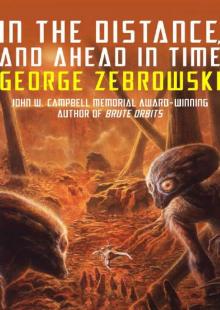 In the Distance, and Ahead in Time
In the Distance, and Ahead in Time Stranger Suns
Stranger Suns Black Pockets
Black Pockets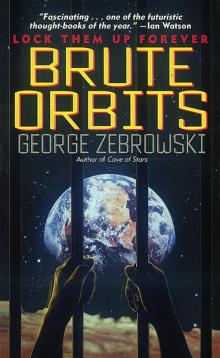 Brute Orbits
Brute Orbits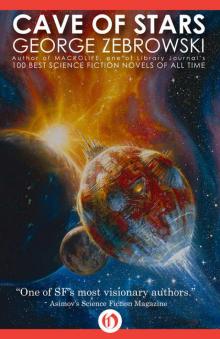 Cave of Stars (Macrolife Book 2)
Cave of Stars (Macrolife Book 2)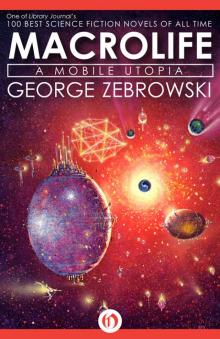 Macrolife
Macrolife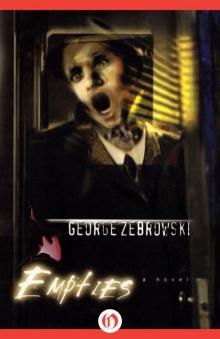 Empties
Empties Heart Of The Sun Star Trek 83
Heart Of The Sun Star Trek 83 The Sunspacers Trilogy
The Sunspacers Trilogy